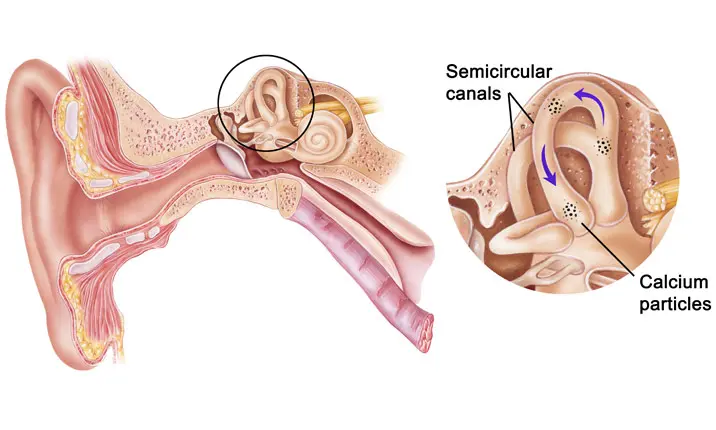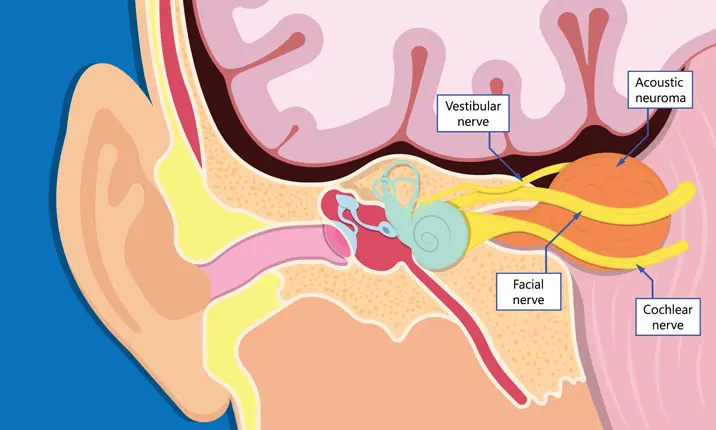-
-
Featured Care Areas


Source: Shutterstock
Feeling Dizzy? Find Out if it is Vertigo
Last updated: Monday, April 12, 2021 | 5 min reading time
Think you have a 'vertigo sickness'? Vertigo is actually a symptom, and not an illness. Learn the causes and treatment of vertigo, and how to tell if it is a sign of something more serious.
What is vertigo?
Vertigo is a symptom, and not a condition in itself, even though some individuals may term the experience as a 'vertigo sickness'.
It is a sensation where you, or your surroundings, appear to be moving or spinning around in circles. This happens while you're stationary in one spot.
You may also experience:
- Dizziness, light-headedness or feeling as if you are about to faint
- Feeling sick
- Headache
- Loss of balance – difficulty standing or walking
- Nausea and/or vomiting
- Pressure in the ear
- Tinnitus (ringing ears) or hearing loss
These symptoms may range in severity, from barely noticeable to an intensity that makes it difficult to continue your daily routine. Vertigo can develop suddenly and last briefly for a few seconds to several days in severe cases.
What causes vertigo?
Vertigo is often caused by a problem in the way balance works in the inner ear. In some instances, it can also be triggered by problems in certain parts of the brain.
Vertigo can fall into either one of 2 categories:
- Peripheral vertigo
- Central vertigo
Peripheral vertigo
Peripheral vertigo commonly occurs when there is an interference with the small sensory organs in the inner ear responsible for sensing gravity and sending information about the head's position to the brain. Around 93% of vertigo cases are due to peripheral vertigo.
These are most common causes of this condition:
- Benign Paroxysmal Positional Vertigo (BPPV) occurs when small calcium particles in the ear become dislodged and move into the inner ear canal. This causes the ear to become hyper-sensitive to changes in head position, which causes you to feel dizzy. BPPV can occur with no specific triggers, but it is commonly associated with old age and is more common in women than men.
- Meniere's disease is caused by a build-up of fluid in the inner ear. It can lead to vertigo with ringing in the ears (tinnitus) and hearing loss. It is common in people between the ages of 40 and 60 years old.
- Labyrinthitis and vestibular neuritis are disorders resulting from an inflammation of the inner ear labyrinth and the surrounding nerves (known the vestibular nerves) which are responsible for sending messages to the brain that help control balance. This condition is often due to a viral infection.
Central vertigo
Central vertigo can occur when there is a disorder in one or more parts of the brain that controls the nervous system. Central vertigo can be the result of a sports-related head injury, brain tumour, viral infection, or a stroke. The symptoms generally last longer and are more intense compared to peripheral vertigo, although hearing isn't typically affected. Below are the different types of vertigo associated with the central nervous system:
- Acoustic neuroma, or vestibular schwannoma, is a slow-growing non-cancerous tumour that affects the nerves between the inner ear and the brain. Common signs of this condition include gradual hearing loss, tinnitus in the affected ear, loss of balance, facial numbness and vertigo.
- Migraine-induced vertigo may be more common in people who are susceptible to motion sickness or frequent episodes of vertigo. Due to the intensity of the migraine, you may experience spontaneous vertigo attacks that are often accompanied with nausea and vomitting.
- Multiple sclerosis is an unpredictable, often disabling disease of the central nervous system. It disrupts the flow of information within the brain, and between the brain and body, which can lead to vertigo.
Am I at risk of vertigo?
Some people are more prone to experiencing vertigo than others. The risk of developing vertigo is much higher if you:
- have a history of cardiovascular diseases
- have had a recent, recurrent or chronic ear infection
- have a history of head trauma
- take medication with adverse side effects, such as antidepressants and antipsychotics
- are above the age of 65.
How is vertigo diagnosed?
People with true vertigo will experience the room around them spinning. Feeling faint or light-headed is usually described as dizziness.
Your doctor will question you about your symptoms, carry out a physical examination, and may use one of the following tests supported by imaging tests such as X-rays or MRI scans.
- Head-thrust test: You will be asked to concentrate on the doctor's nose and try to follow it with your eyes as the doctor moves around. This is to check for correct eye-movement.
- Romberg test: You will be told to maintain your balance while standing with your feet together, and then with your eyes closed.
- Fukuda-Unterberger test: While maintaining balance, you will be asked to march on the spot to check for your coordination abilities.
- Dix-Hallpike test: You will be asked to quickly lower yourself from an upright seated position to laying down flat on your back on an examination table. The doctor will then point your head slightly to either side to observe your eye movements.
You may need one or more tests or procedures to help your doctor learn more about your underlying condition. Some of these tests are usually performed in a dark room to trigger vertigo.
How to treat and cure vertigo?
The type of treatments administered depends on the cause of your vertigo. In most cases, you will be advised to take bed rest along with medication for the underlying causes of your vertigo.
The most popular types of medication that alleviate vertigo are vestibular blocking agents.
If you have been diagnosed with benign paroxysmal positional vertigo (BPPV), your doctor will teach you a specific movement called the Epley repositioning manoeuvre, which loosens the calcium crystals and clears them from your ear canal.
Surgery is also an option if none of these treatments work or if your symptoms become too severe.
How to ease vertigo symptoms
If you are experiencing a vertigo attack, there are a few things you can do to ease the symptoms and to reduce the number of episodes you have:
- Lie still in a quiet, dark room
- Move your head carefully and slowly if you must do any activities
- Sit down immediately when you feel dizzy
- Turn on the lights if you need to get up at night
- Use a walking stick if you're at risk of falling
- Sleep with your head slightly raised on pillows
- Get out of bed slowly and sit on the edge of the bed for a while before standing up
- Try to relax as anxiety can worsen vertigo
When should I see a doctor?
See a doctor if you experience frequent episodes of vertigo. Vertigo can make you unsteady, which may put you at risk of falling. While vertigo is usually not harmful, you may want to identify the root problem and have it treated.
The warning signs of serious complications from vertigo include:
- sudden, intense, and recurring episodes of motion sickness
- vertigo along with neurological weakening such as a sudden loss in facial muscle control
- vertigo along with hearing loss
If you are experiencing these abnormal symptoms, seek immediate help by going to the nearest Urgent Care Centre (UCC) or call for an ambulance.
During a medical emergency in Singapore, you can also call +65 6473 2222 for an ambulance that will transport you to the nearest hospital or a hospital of your choice. Learn more about Parkway Emergency services.
Nancy, C. (17 August 2017) What Causes Vertigo? Retrieved 27/04/2019 from https://www.healthline.com/symptom/vertigo
Markus, M. (24 November 2017) Everything you need to know about vertigo. Retrieved 27/04/2019 from https://www.medicalnewstoday.com/knowledge/160900/vertigo-causes-symptoms-treatments
Nayana, A. (22 December 2018) Vertigo. Retrieved 27/04/2019 from https://www.webmd.com/brain/vertigo-symptoms-causes-treatment#2
(30 June 2018) Benign paroxysmal positional vertigo (BPPV). Retrieved 27/04/2019 from https://www.mayoclinic.org/diseases-conditions/vertigo/symptoms-causes/syc-20370055
Debra, R. (2 Jan 2018) What Are the Home Remedies for Vertigo ). Retrieved 27/04/2019 from https://www.medicalnewstoday.com/articles/320492.php
Vertigo. Retrieved 31/05/2019 from https://www.nhsinform.scot/illnesses-and-conditions/ears-nose-and-throat/vertigo
Vertigo. (2020, June 2) Retrieved February 22, 2021, from https://www.nhs.uk/conditions/vertigo/
Markus, M. (24 November 2017) Everything you need to know about vertigo. Retrieved 27/04/2019 from https://www.medicalnewstoday.com/knowledge/160900/vertigo-causes-symptoms-treatments
Nayana, A. (22 December 2018) Vertigo. Retrieved 27/04/2019 from https://www.webmd.com/brain/vertigo-symptoms-causes-treatment#2
(30 June 2018) Benign paroxysmal positional vertigo (BPPV). Retrieved 27/04/2019 from https://www.mayoclinic.org/diseases-conditions/vertigo/symptoms-causes/syc-20370055
Debra, R. (2 Jan 2018) What Are the Home Remedies for Vertigo ). Retrieved 27/04/2019 from https://www.medicalnewstoday.com/articles/320492.php
Vertigo. Retrieved 31/05/2019 from https://www.nhsinform.scot/illnesses-and-conditions/ears-nose-and-throat/vertigo
Vertigo. (2020, June 2) Retrieved February 22, 2021, from https://www.nhs.uk/conditions/vertigo/












